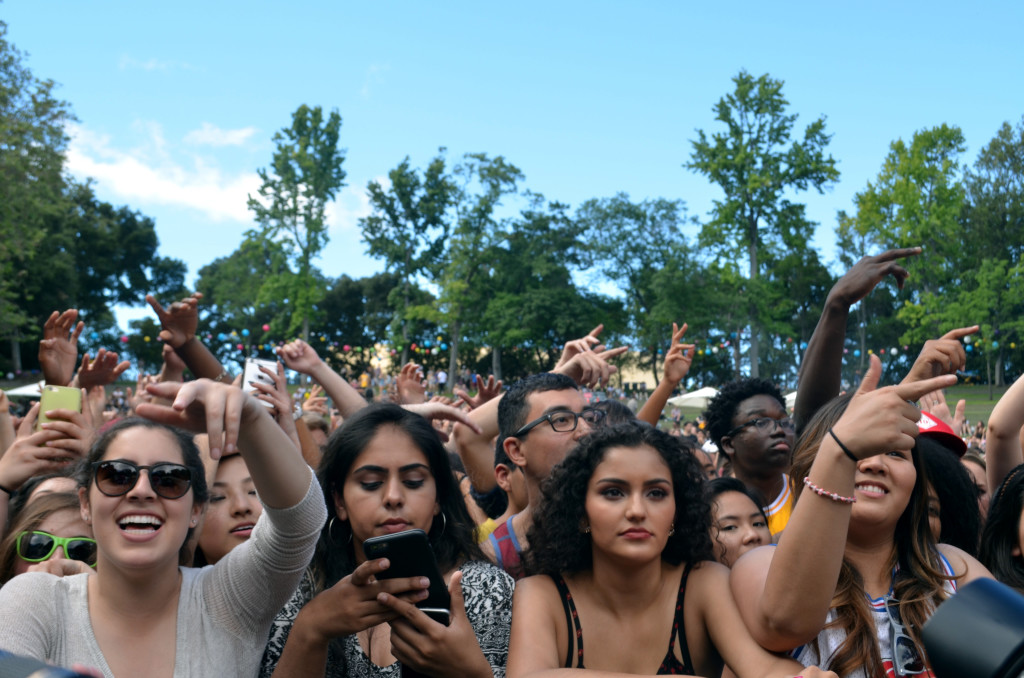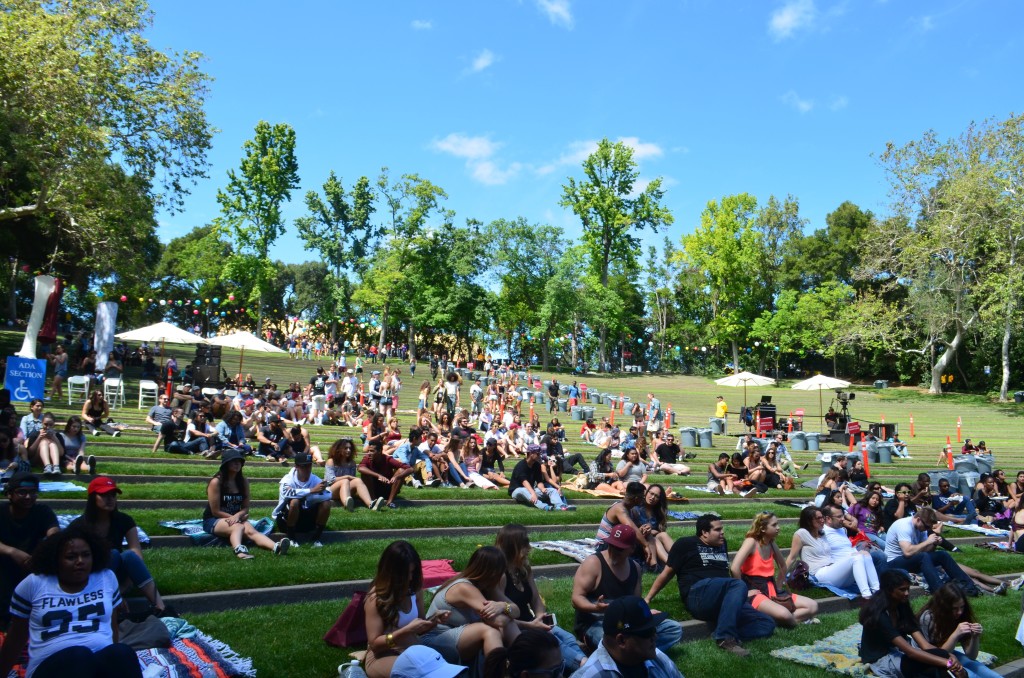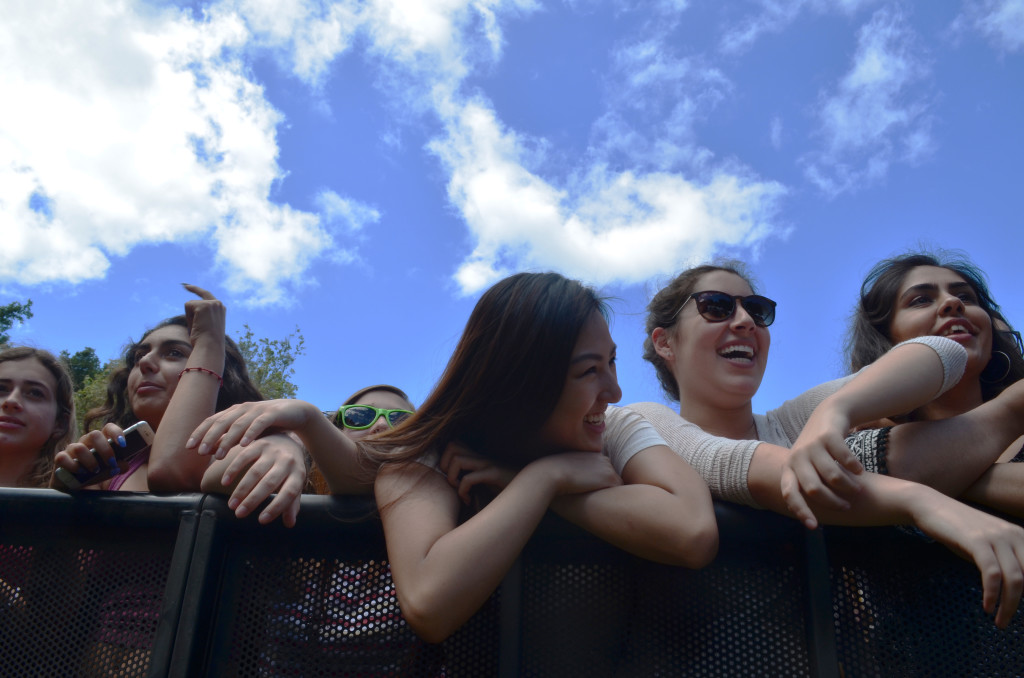 Since this was my first Frost, I did my research and tried to adequately prep myself for Stanford’s hotly anticipated annual music and art festival. I put on sunscreen, ate a large brunch, and charged my phone. Still, perhaps, the most taxing Frost mythos that I had to fortify myself for was the invasion of our beloved amphitheater by those pesky, young things: the teens.
Since this was my first Frost, I did my research and tried to adequately prep myself for Stanford’s hotly anticipated annual music and art festival. I put on sunscreen, ate a large brunch, and charged my phone. Still, perhaps, the most taxing Frost mythos that I had to fortify myself for was the invasion of our beloved amphitheater by those pesky, young things: the teens.
I may sound like a hag, but hear me out. A week before Frost, I was at the juniors’ (or as it’s now called, trend) section of Nordstrom when I overheard-or eavesdropped, you be the judge-a #girlsquad talking about their ACT classes. Then, one girl stopped and said, “I still have to find an outfit for Fetty!!!” I immediately threw some side-eye their way, shoved the bodysuit I was holding back into its rack, and sulked away.

As expected, there was no drought of youth-here, meaning high school students and younger-at this year’s Frost. They came out in all of their angsty teen glory, contoured and crop-topped to near perfection. I felt a pang of nostalgia for the matronly babydolls and strawberry-flavored Lip Smackers of my adolescence, but this was on another level. These pubescents were Insta-ready and undeniably cool (though some may question the apparent basketball jersey trend). Still, don’t let their glazed-over look of indifference fool you; they will stop at nothing to get a brush from celebrity-e.g. The teen offering $5,000 for a backstage pass. They screamed at arbitrary intervals and whipper snapchatted with reckless abandon. They were thirsty and probably also dehydrated. But to be fair, so was I.
I forgave these minor annoyances, rolled my eyes and swept them under that familiar refrain- kids these days. But some moments at Frost were harder cast away: most notably, non-black people singing and shouting the n-word, more than once. Black folx don’t need me as their spokesperson, but it’s worth reminding that it’s never okay to say the n-word as someone who is not black. Don’t do this! It is a word that belongs to Sage and Fetty and other black folx. And while I’m not naïve enough to think that the youths were the only ones culpable of this behavior, I can’t help but think back to my own teenaged days at my predominantly white and Asian high school. Classmates said the n-word without a care or a critique. This ignorance of something so basic becomes compounded when considering the broader issue of consuming and enjoying hip-hop and rap at a university where only 7.8% of the student body is black, where the neighboring high school consists of 3.4% black students, in a city where only 1.8% of residents are black. The issue is that we love black culture-we post that sick selfie with Fetty, hope that he’ll retweet it-but when it comes to everyday black lives we often go quiet. Tweet, tweet and, then, not a peep. We give kids and teens excuses in our heads, claiming that they’ll grow out of it instead of realizing they’re just growing into this behavior.

Let it be known that I, the seemingly cankerous killjoy, had fun at Frost. Time seemed to slow in that tucked away grove of an amphitheater. The sun restored my golden complexion. I stood two feet away from Sage and watched him and his crew get down to Fetty’s performance, a moment which was so tender that I forgot to snap a pic for posterity.
Still, back to the flash-tatted teens: besides using questionable language and outwardly thirsting for their brush with fame, the teenyboppers’s age became even more felt when Sage came on stage. Shirtless and flirty, Sage called out to the audience with a toothy grin, “Where my baby mama at?” I cringed a little when Sage dropped that line because it seemed to me that the demographic that so readily swooned and raised their hands in tribute were mostly teens-underage girls whose former childhood cuteness edges too uncomfortably close to sexiness. Maybe it’s not Sage’s fault; he can’t control who goes to his gigs. Who do we wag our fingers at, then? The parents? The teens themselves? Yes, his hoot objectifies women; yes, it perpetuates that singular, macho version of masculinity. While I’m not necessarily defending this swaggy bravado, I think it’s important to ask ourselves why are we so quick to criticize hip-hop and rap when so much of music, across genres, reinforces similar gender roles? Where are those critiques?

Teens make it so easy to pick on them, but I hesitate to do so because who am I—donning my tiny tank from Urban Outfitters, my Brandy Melville denim skirt (It’s so gosh darn cute, ok?)—to judge? What makes me so different from them? A year, maybe two? So it feels laughable and Puritanical for me to cast judgment and doing so feels like it goes against everything I hold to be true: that girls, women, people can do whatever they want to their bodies and their beings.
In my critiques of the youngsters, I find troubling echoes of a familiar voice—that is, the bitter voice of a bygone era that looks down at us, that tells us to look up from our phones, but forgets they gave us these devilish devices in the first place. It’s the voice that privileges that which is entrenched in history and doubts the value and validity of anything new (or different or other). It’s the voice that says no good music has been made in the last twenty years and that they’re still waiting for the next “Yesterday.” This isn’t anything new. Each generation scowls at the next.
Teenagedom has always been doomed to be at the center of this generational disdain. We’re obsessed and distressed by youth and their flawless feeds because they remind us so acutely of what we aren’t anymore: young, free, wild things. I’m even wistful for my own adolescence-a hilarious thought because I’m only nineteen. And still, when I go to class having only skimmed the reading, my mind wanders to the past, to my high school self. From this retrospective lens, I sometimes look back to my former self with awe. High school me was so much stronger; she was so organized, so put together, so perfect. How did she do it?

And this is where Fetty—the high school dropout—comes in. He pulls up on stage in a university cart, opening with his newest single “Wake Up,” a graduation anthem of sorts, and spits into the mic, “If you have a 2.0 or higher make some noise.” I suspect he says this at every university venue, and I’m even more certain that these particular words tickled our student body, especially being who we are and where we are and how we got here. Compared to his later banger performance of “Trap Queen,” “Wake Up” was a kickback. The track wasn’t an ode for the overachiever, but for the ones who move to a different beat, which rings truer to what adolescence actually felt like (even when you were a nerd, like me)-like you don’t belong, like you’re constantly being judged. We’re desperate to gloss over these less than glamorous bits, preferring the story of our glorious youth. Who wants remember that adolescence was messy and embarrassing? That it was a zit show where limbs got gangly and flesh became stretched? Fetty gets this. His music isn’t moving, but makes you move. He gets what it’s like to inhabit the hormone rager that is the adolescent body-not as something smooth and idealized, but influx and sometimes f*cked up, too.
So when we witness such overt displays of youth, as I did at Frost, our initial inclination is to shudder. Not only are we sad over the loss of our own youth, but also we’re grossed out by the fact that we, too, were once this young. And still, as day wore on and the concealer wore off, I lost most ability to differentiate between age groups-underneath, we’re all so, so young. The sun began to set, the sweaty masses filed out of Frost. Some teen from afar ate the remaining bites of his nachos. Nothing lasts forever.
